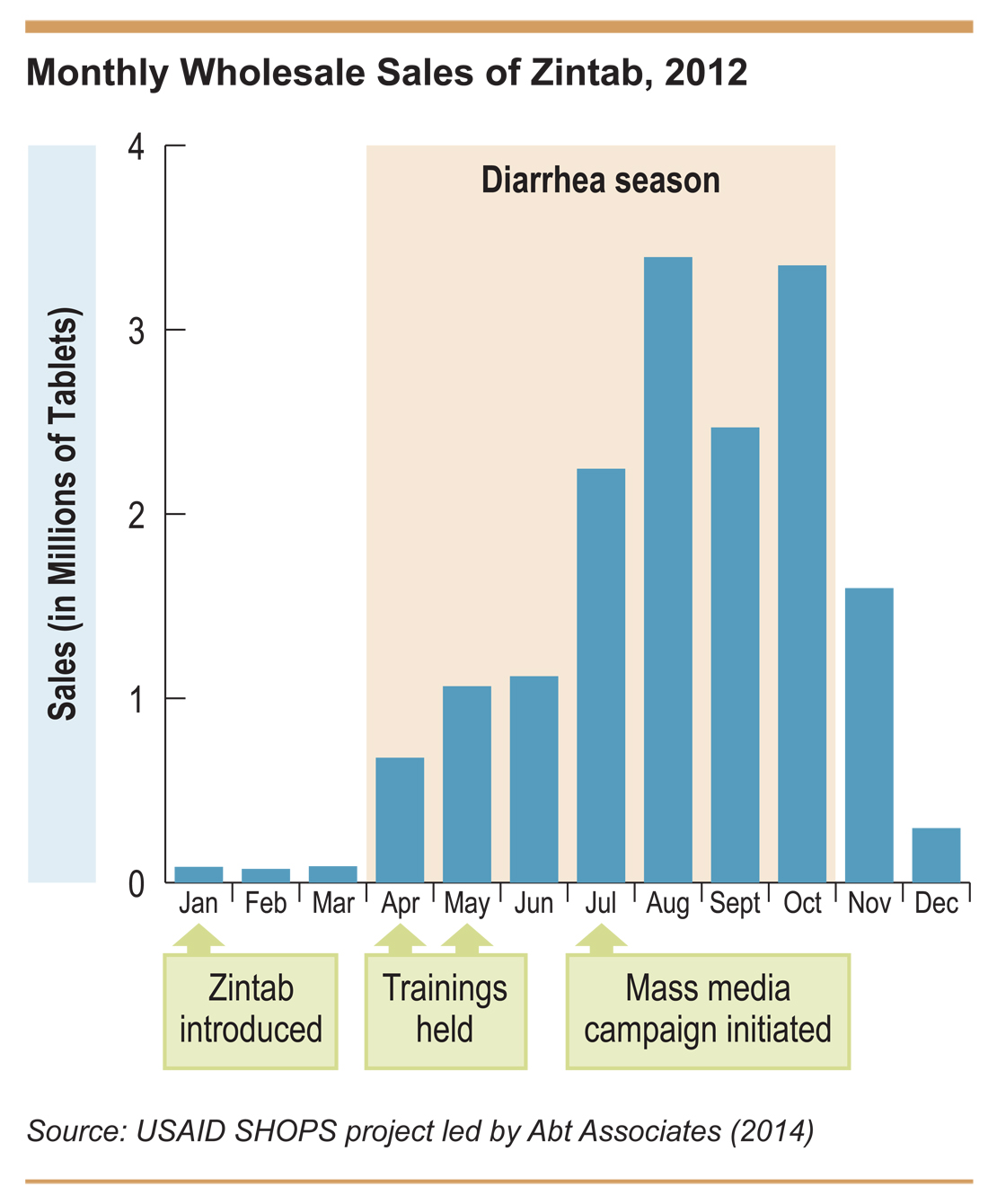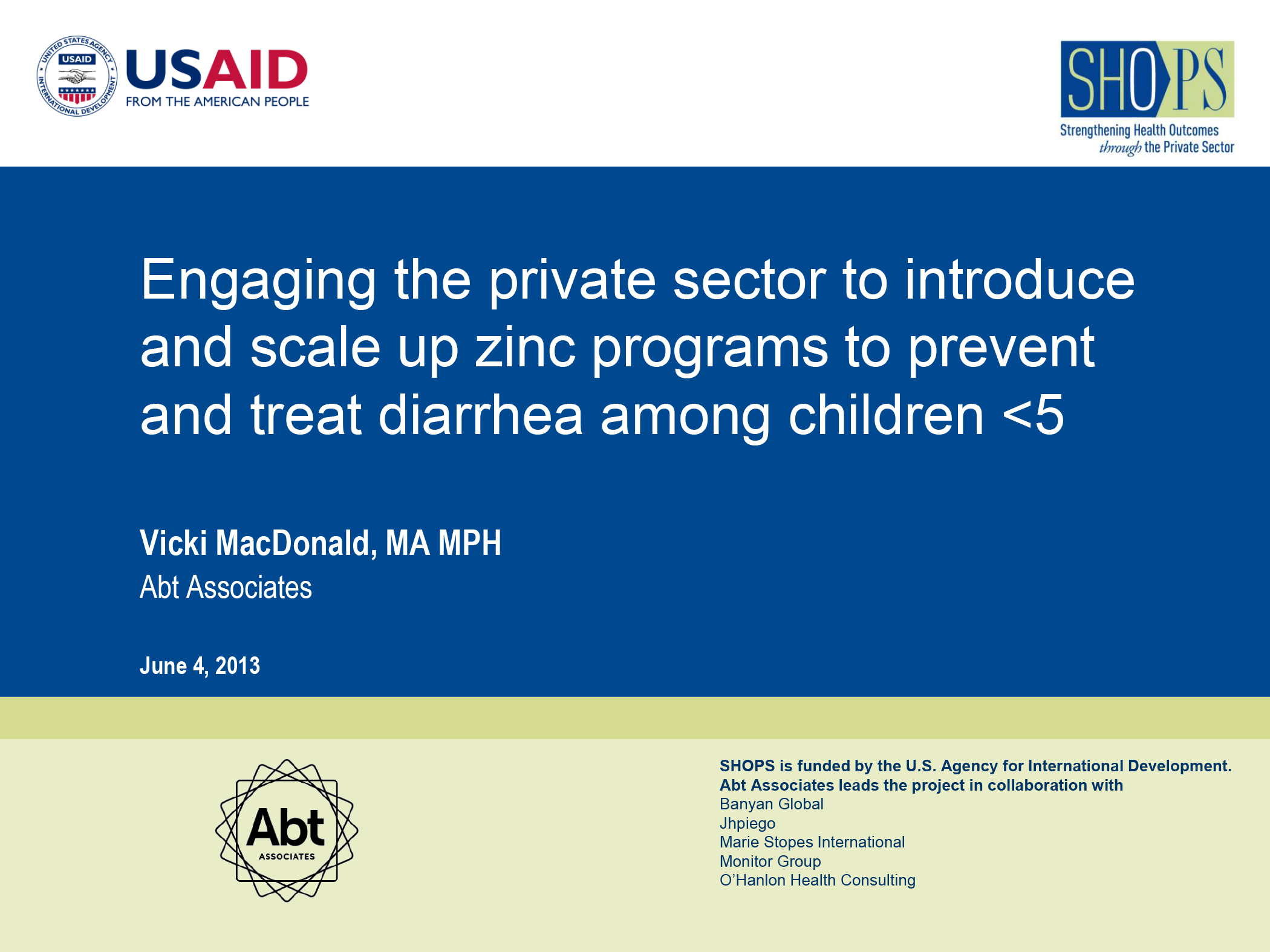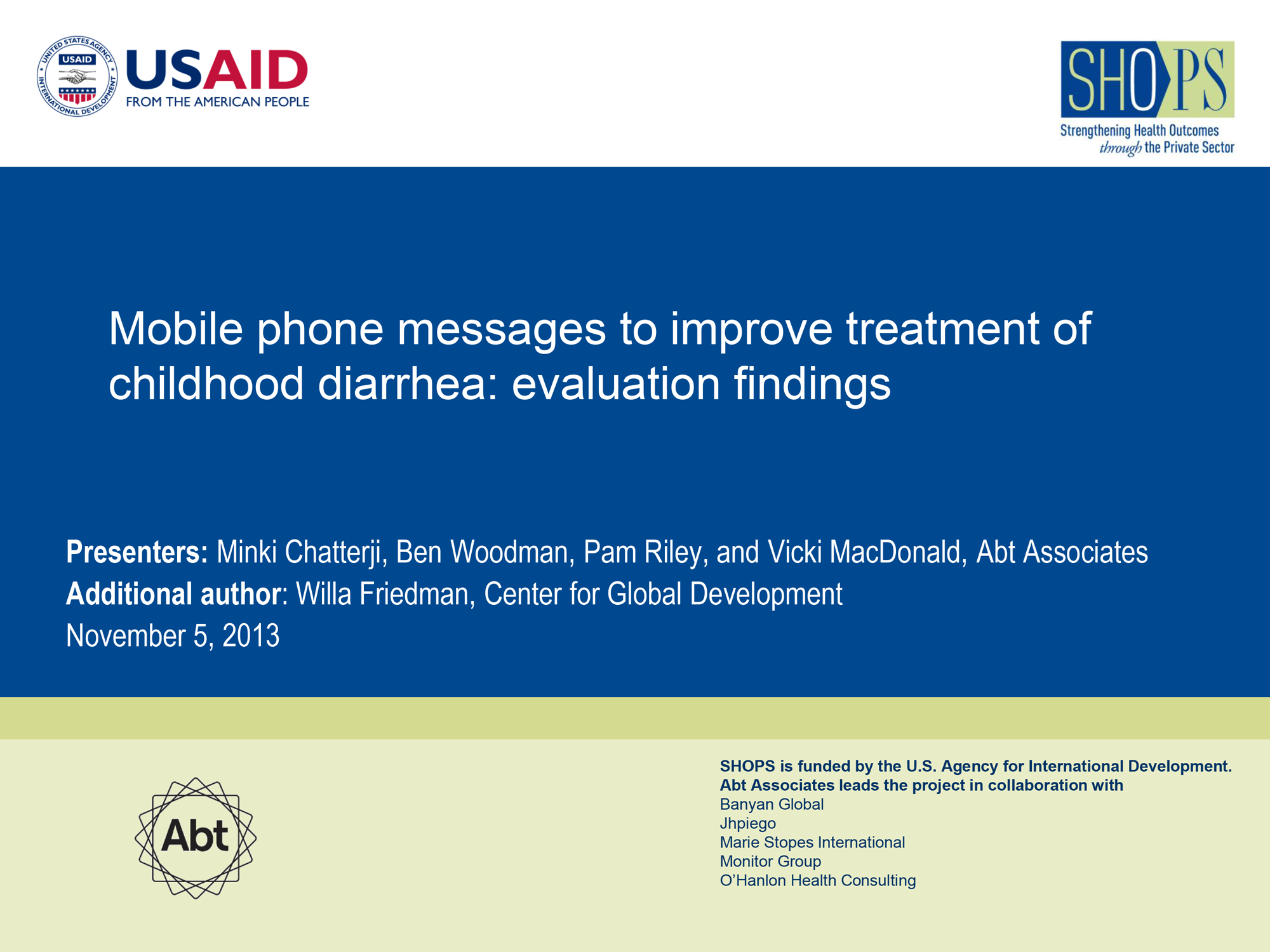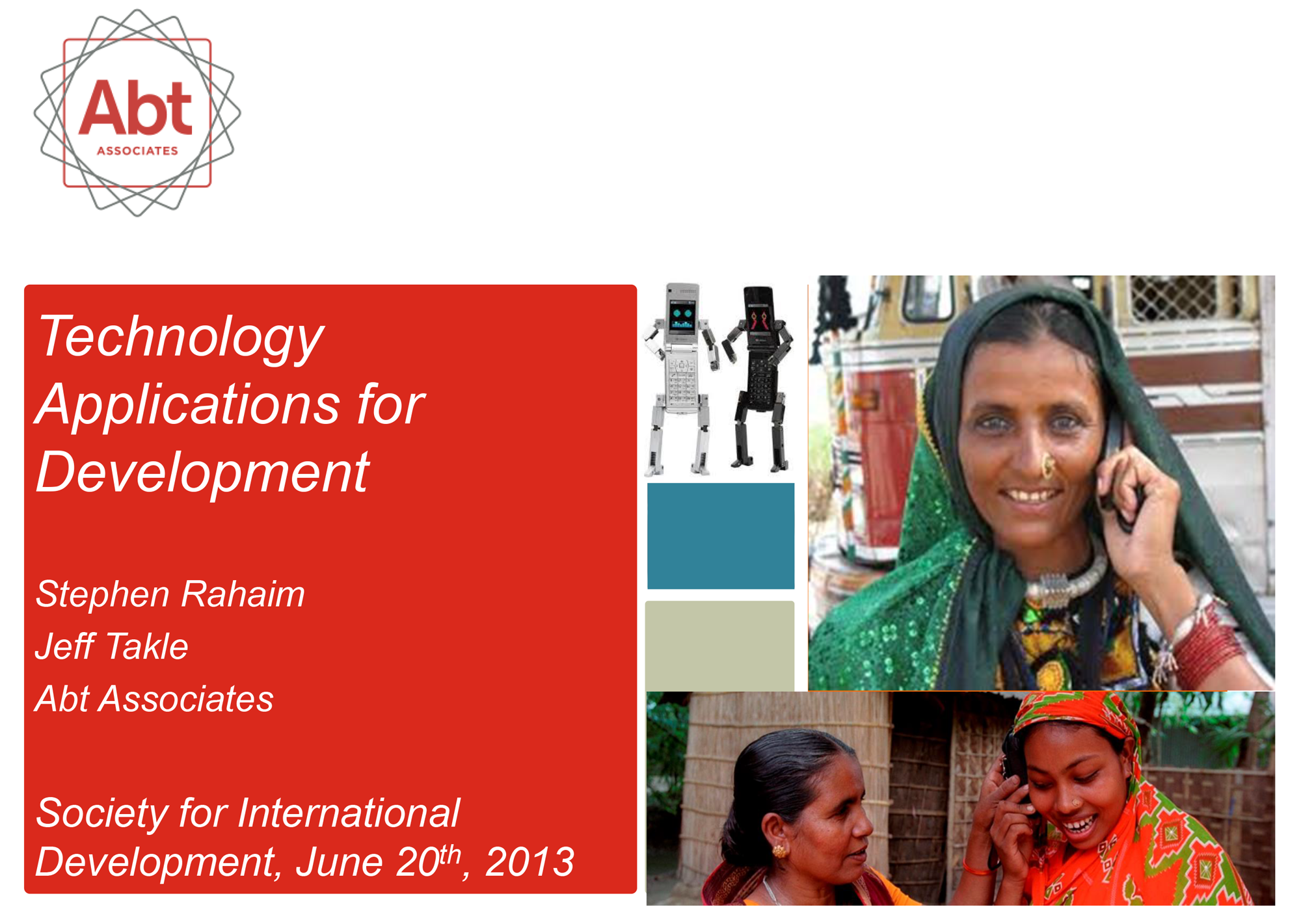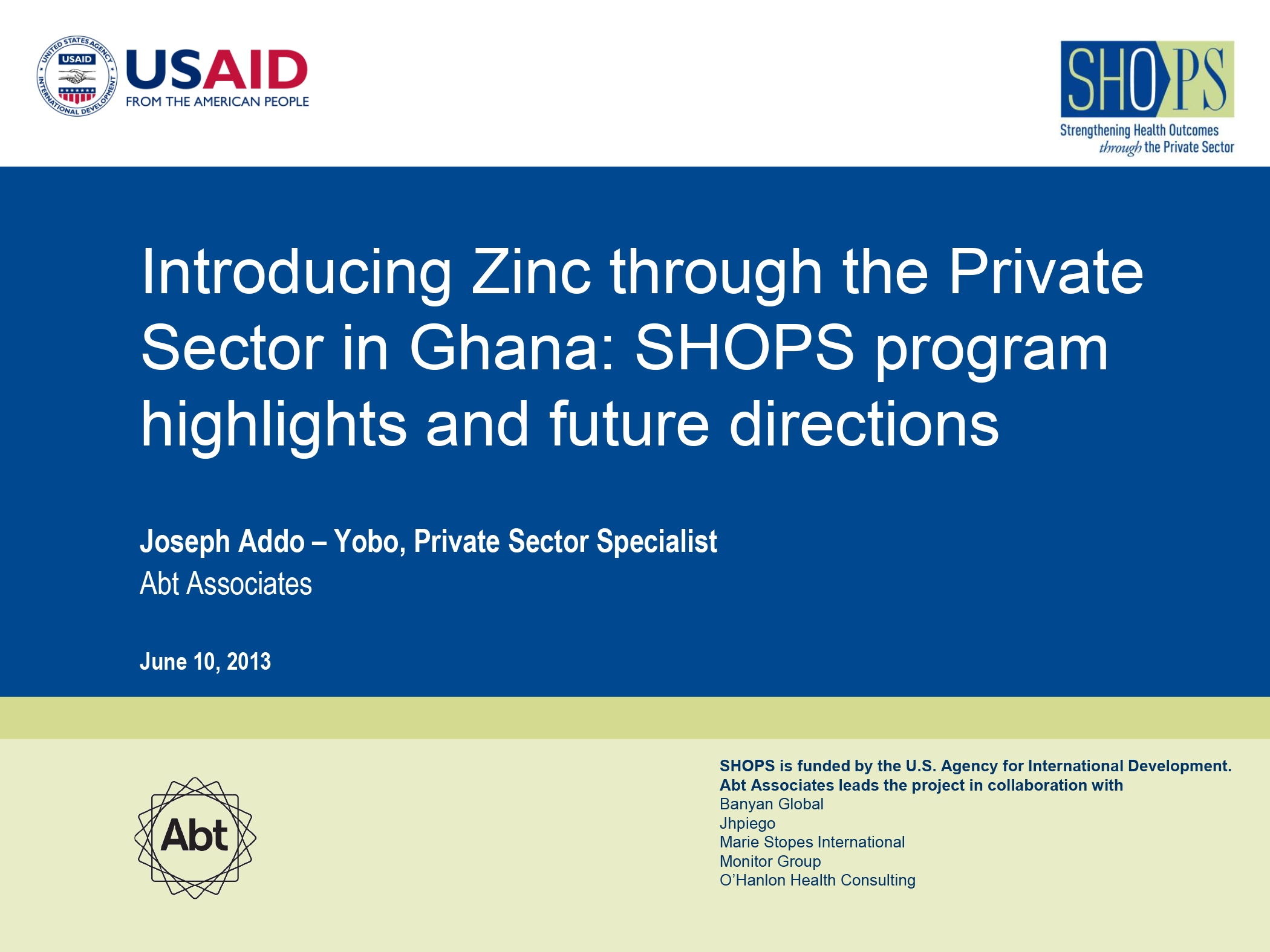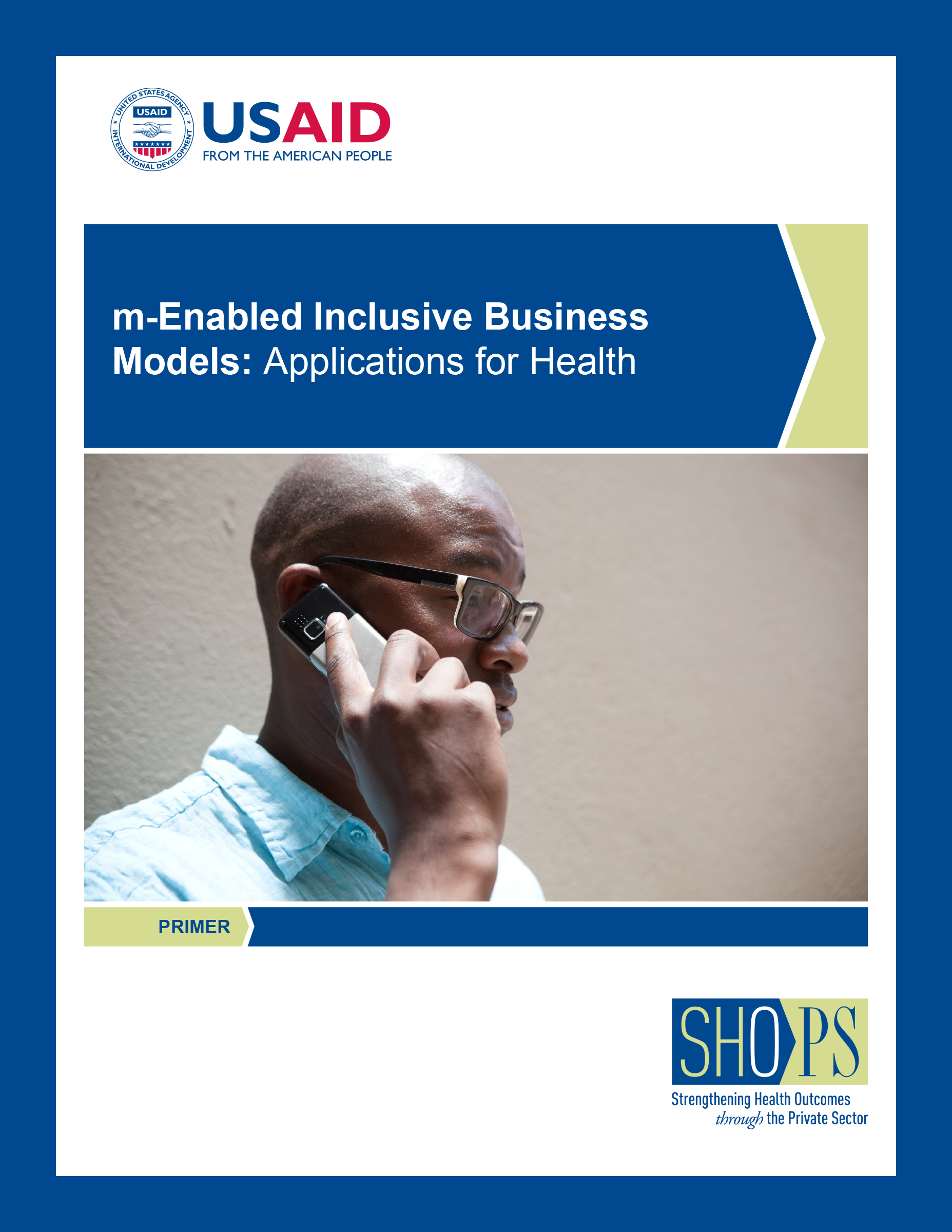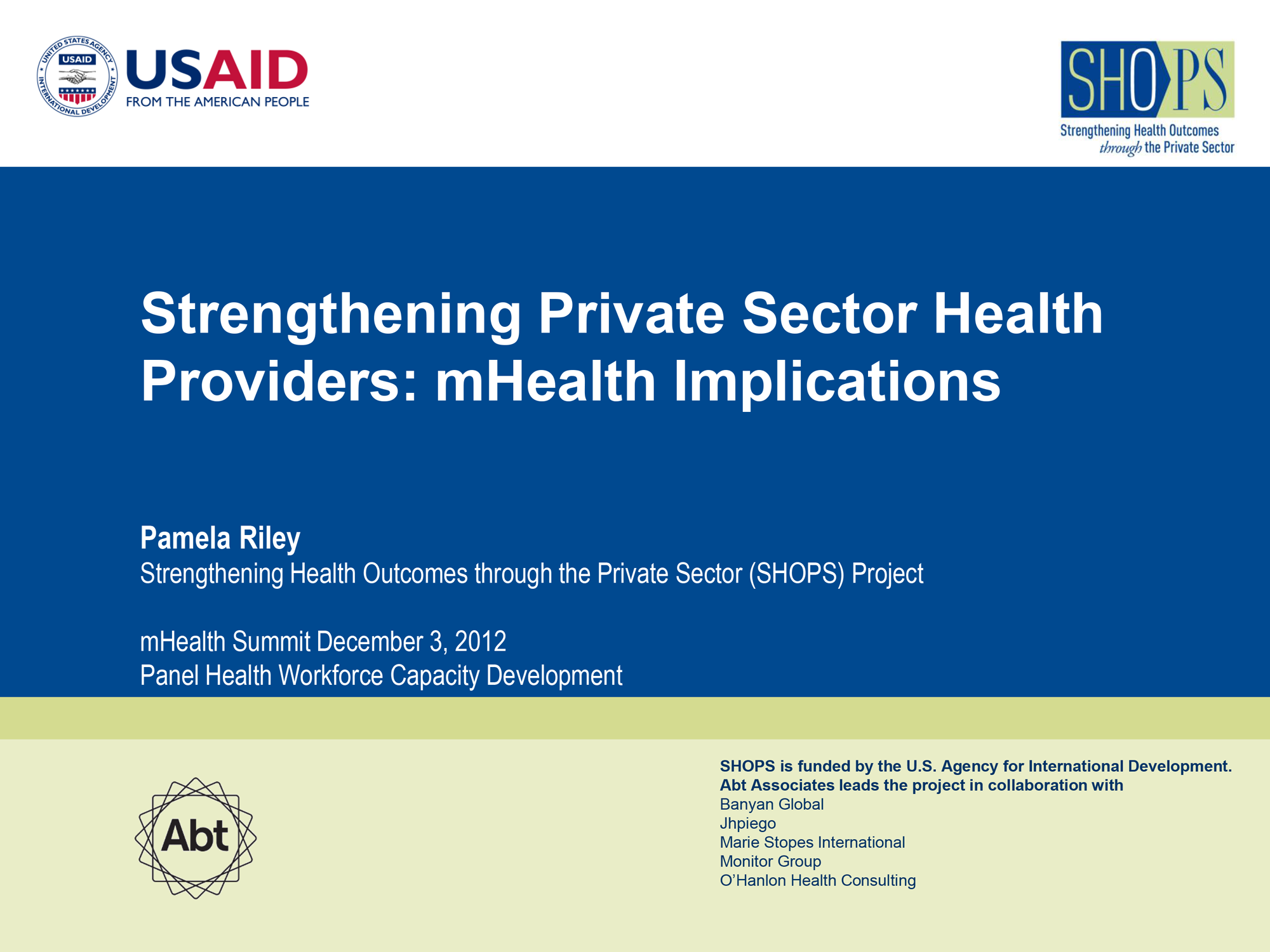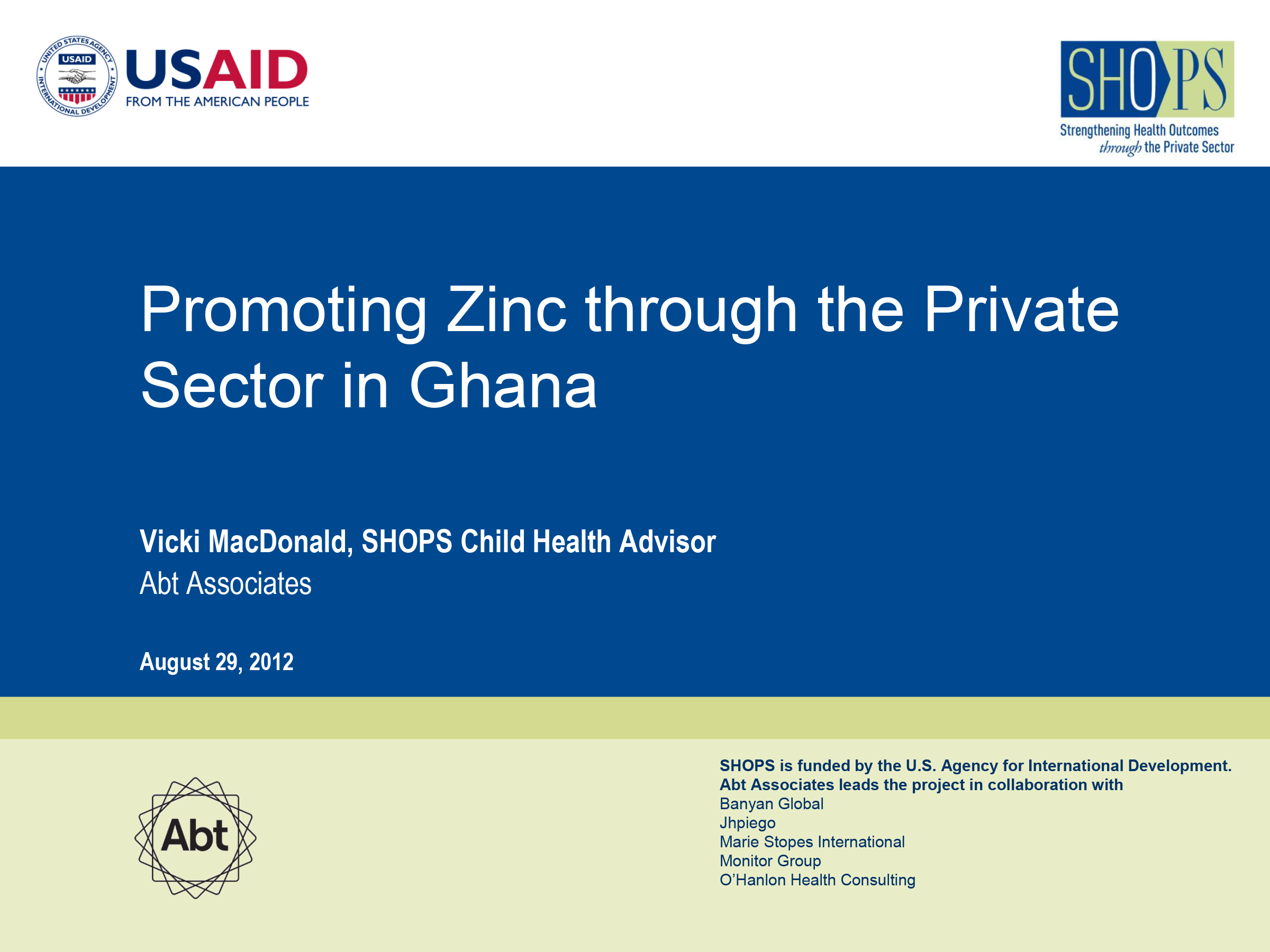
Resource Library
Ghana Licensed Chemical Sellers Increase Provision of Zinc to Treat Childhood Diarrhea
This study evaluates the effectiveness of a diarrhea management training and marketing program for licensed chemical sellers and a mass media campaign. The interventions, which have led to a high level of zinc sales, are a promising approach to promote the use of ORS and zinc as a childhood diarrhea treatment.
Resource Type : Brief
Country : Ghana
Year : 2014-12-18T00:00:00
Language :
Project : SHOPS

Resource Library
Engaging the Private Sector to Introduce and Scale Up Zinc Programs to Prevent and Treat Diarrhea among Children <5
In this presentation, MacDonald discusses how to engage the private health sector to increase the use of zinc to prevent and treat diarrhea in children under five. In her presentation she concludes that the mass media can significantly increase awareness among caregivers and private sector channels are viable, effective options for delivery of zinc.
Resource Type : Presentation
Country : Ghana, Nepal
Year : 2013-07-08T00:00:00
Language : English
Project : SHOPS

Resource Library
Mobile Phone Messages to Improve Treatment of Childhood Diarrhea
This study analyzes the effects of a text message intervention on the knowledge and prescribing behavior of licensed chemical sellers in Ghana. Both control and treatment groups in this study attended an educational session on oral re-hydration salt therapy for diarrhea. Additionally, the treatment group received follow-up text messages with information about oral re-hydration salts and quizzes on diarrhea treatment. The study concluded the text messages had an impact on the knowledge retained by the licensed chemical sellers but had limited effects on their behavior. This presentation was made by Minki Chatterji, Ben Woodman, Pamela Riley, and Vicki MacDonald at a USAID Global Health Technical Brown Bag session. Another version of the presentation was made by Minki Chatterji at the Private Sector Pre-Day to the International Health Economists Association's World Congress in July 2013 and at the Population Association of America's annual meeting in April 2013.
Resource Type :
Country : Ghana
Year : 2013-12-17T00:00:00
Language : English
Project : SHOPS

Resource Library
Technology Applications for Development
In this presentation, Stephen Rahaim and Jeff Tackle each discuss ways they have applied technology to development work. Rahaim presents a randomized controlled trial that the SHOPS project conducted in Ghana to understand how text message follow-ups to diarrhea management training affect licensed chemical seller's knowledge of diarrhea treatments and their prescribing behavior. Tackle discusses how the African Indoor Residual Spraying project, which is implemented by Abt Associates, is using GPS technology to ensure environmental compliance. He also discusses how a new technology called GxAlert is helping connect healthcare providers, labs, and national tuberculosis programs so that data on diagnoses can be shared more rapidly.
Resource Type : Presentation
Country : Ghana
Year : 2013-07-08T00:00:00
Language :
Project : SHOPS

Resource Library
Introducing Zinc through the Private Sector in Ghana
In this presentation, Joseph Addo-Yobo outlines the SHOPS initiative to combat child mortality due to diarrheal disease in Ghana through introducing zinc treatment in conjunction with oral rehydration salts (ORS). The program partners with the pharmaceutical sector and promotes the use of zinc to both providers and the publis through a large-scale communications campaign.
Resource Type : Presentation
Country : Ghana
Year : 2013-07-05T00:00:00
Language : English
Project : SHOPS

Resource Library
m-Enabled Inclusive Business Models: Applications for Health
The SHOPS project funded a 16-month study conducted by the Monitor Group as reported in Promise and Progress: Market-based Solutions to Poverty in Africa. The study identified mhealth (mobile applications for health) business models enabling enterprises to successfully engage with the poor in Africa, primarily in Ghana, Kenya, Senegal, South Africa, and Tanzania. This primer aims to:
- Highlight key practices that will assist m-enabled enterprises in reaching commercial viability in the near term
- Assist funders interested in business model principles that enable sustainable impact
Presenting four case studies on m-enabled solutions and 10 lessons for consumer-facing and systems-oriented mhealth projects, the primer shows that inclusive businesses in all sectors are still in their infancy and that much can be learned about how they work, why many struggle, and why only a few succeed.
Resource Type : Report
Country : Ghana, Kenya, South Africa, Tanzania
Year : 2013-03-01T00:00:00
Language : English
Project : SHOPS

Resource Library
Strengthening Private Sector Health Providers: mHealth Implications
In sub-Saharan Africa, private providers play an important role in the delivery of health care to people of all wealth quintiles. However, in many countries, private providers are not well organized and sometimes isolated in rural areas; they often operate in parallel to the public health system; and they have limited access to training opportunities. This presentation discusses how mobile phone technology has the potential to address some of these issues. It reviews the findings from a randomized control trial that looked at how text message reminders received in the weeks following a training course impacted providers' retention of information learned in the course. It was presented at the mHealth Summit in Washington as part of a panel on health workforce capacity development.
Resource Type : Presentation
Country : Ghana
Year : 2012-12-03T00:00:00
Language : English
Project : SHOPS

Resource Library
Promoting Zinc through the Private Sector in Ghana
This presentation discusses how the SHOPS project is promoting quality zinc products through the private health sector in Ghana, creating consumer demand for zinc as an integral part of diarrhea management through a communications campaign, and educating and sensitizing the provider community about new protocols related to zinc and diarrhea management.
Resource Type : Presentation
Country : Ghana
Year : 2012-08-22T00:00:00
Language : English
Project : SHOPS

Resource Library

Zinc and ORS Awareness TV Spot
In June 2012, the Ghana Health Service and SHOPS launched a major communication campaign to increase the awareness of caregivers about the new WHO/UNICEF-recommended diarrhea treatment with zinc and ORS and to promote correct use of those treatments. This TV advertisement was developed for the campaign by the SHOPS project in collaboration with the Johns Hopkins University Center for Communication Programs.
Resource Type : Video
Country : Ghana
Year : 2012-08-15T12:00:00
Language : English
Project : SHOPS

Resource Library
Technical Exchange on Engaging the Private Sector to Strengthen Health Systems and Achieve HIV/AIDS Goals
Health Systems 20/20 and Strengthening Health Outcomes through the Private Sector (SHOPS) - joined efforts with the International Finance Corporation (IFC) Health in Africa Initiative (HiA) to convene a technical exchange for sub-Saharan African countries on facilitating public-private linkages for health systems strengthening. The technical exchange builds on the USAID-funded Network for Africa (N4A) initiative begun under the Private Sector Partnerships-One project (PSP-One) and continued under SHOPS. In 2009 PSP-One and IFC jointly conducted a private health sector assessment in Kenya and continue to coordinate policy reforms in that country. Recently, SHOPS and IFC completed a three day workshop in September 2010, designed for West African policymakers and private sector champions on the role of PPPs in health. The purpose of the technical exchange was to: i) share experiences within the region on building public-private partnerships which will contribute to health systems strengthening and improve overall health and HIV/AIDS outcomes; ii) identify key factors and lessons that contribute to effective private sector engagement and that can be applied to partnerships; iii) develop action plans that country teams can implement upon returning home; and iv) using the N4A platform, encourage communication and networking between the workshop participants. This report summarizes the workshop.
Resource Type : Report
Country : Ghana, Kenya
Year : 2012-03-02T00:00:00
Language : English
Project : SHOPS
Pagination
- Previous page
- Page 4
- Next page


